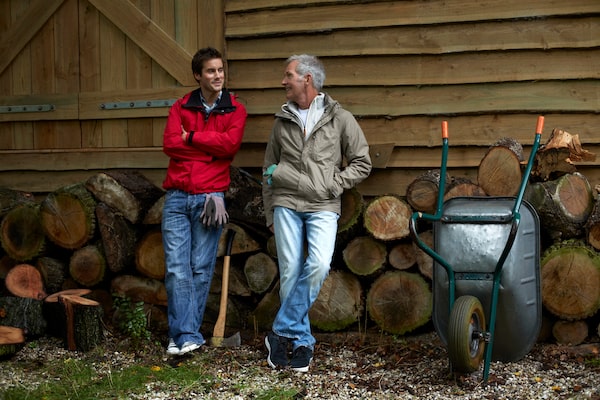
Urban property prices are retreating with higher interest rates, and that could mean more recreational properties will come on the market.Morsa Images/iStockPhoto / Getty Images
Amid rising values for recreational properties, not to mention annual costs such as taxes and upkeep, the unhappy challenge for many older Canadians is how to sell the cherished family cottage without upsetting their children.
For some, the decision to sell might be financial, as the attendant costs of property ownership only go higher. For others, it could be health reasons, the death of a spouse or the reality that for all the wonderful memories the property created, the kids and grandkids don’t use it enough to justify keeping it.
Regardless of the underlying reasoning behind any sale, letting go can be a lot more difficult than selecting an agent and listing the property.
“The biggest difference I find between urban real estate and recreation real estate is the emotional attachment people have to their recreational properties,” says Rob Serediuk, an agent with Sotheby’s International Realty Canada who specializes in cottage properties in Ontario’s Haliburton and Muskoka regions.
He notes that prices for vacation properties soared during the pandemic when people began working remotely. Now, with urban property prices retreating with higher interest rates, he expects more recreational property to come on the market.
“There are a lot of people that are on the fence on whether or not they want to sell,” he says.
He’s currently working with an elderly couple who explored selling the Haliburton-area lakefront property that has been their home for the past decade because they recently purchased a condo. Initially the couple decided to put the sale off for a year, but then they called the next day to begin the sale process.
“With what is happening in the market with real estate, keeping it for another summer could be a major financial impact,” says Sotheby’s agent Karen Houghton, who is also working on the Haliburton sale.
The quick turnaround came after an impromptu family meeting with their adult children and grandchildren, the agents say.
Experts advise older Canadians who are considering the sale of the prized family cottage to take a similar approach to lessen the emotional impact and head off any anger and disappointment.
“Don’t just spring it on the kids as a done deal,” says Peter Lillico, a lawyer with Lillico Bazuk Galloway Halka of Peterborough, Ont.
He generally works with cottage owners who intend to sell a year or two in the future, and says it’s a good idea to introduce the idea to the younger generations well in advance.
“You sort of plant the seed ahead of time that there is going to be a sale: `Hey kids, we all love the cottage, but down the road we are no longer going to be able to afford the cottage’ or ‘nobody is using it anymore.’”
In his experience, reasons for cottage sales are evenly split between financial needs of the older owners, lack of interest in the property from the next generation, or uncertainty that the kids can keep up with the costs and maintenance.
Providing the kids with notice of a planned sale also gives them a chance to get their finances together if they really do want to purchase it.
Mr. Lillico experienced that scenario just this spring with a property. “The kids were financially better off than the parents. They said, `get it appraised and we will buy it from you.’”
He has a few tips for the older generation looking to manage family emotions when starting down the sales process. They include:
- Inform all family members of the decision at the same time.
- Tell the kids you are open to alternatives. “Whether it is lip service or not, the family deserves to be part of the process.”
- Expect emotional objections. “You can anticipate emotional arm-twisting” from children.
- Consider bribery. “For some of them I say, ‘consider sweetening this bitter pill of a cottage loss with a bribe,’” which could be a cash windfall for the kids from a portion of the proceeds. “It’s not for everybody, but it makes it feel like more of a family decision,” he says. “Instead of resentment, [the kids] are grateful to their parents that they are sharing the largess” of the sale.
Ideally, the best time to sell a family cottage is when the children have reached adulthood and are concentrated on their careers but do not yet have kids of their own.
“If parents want to avoid the upset, parents will want to sell it before the grandkids come,” says Aaron Moore, owner of GTA House Buyers, which buys homes and residential properties in Ontario.
Affordability issues for cottage owners have now translated into more acquisition opportunities for his Toronto-based company.
While some owners are looking to cash in on the runup of valuations in recent years, many people are feeling a financial squeeze due to the pandemic and the requirement to pay for their main residence.
For people on tight budgets, even the soaring fuel prices are a concern.
“I just had a conversation with one cottage seller,” says Mr. Moore. “Gas prices have doubled in the past year and they are commuting and that is one thing that they were not expecting. That is a big factor right now.”
An aging boomer population, rising costs and more economic uncertainty should shake up what has been a tight market for vacation properties.
“With the pandemic, people’s jobs and businesses have been impacted and that certainly affects the affordability of a secondary property,” says Mr. Moore.

Interested in more stories about retirement? Sixty Five aims to inspire Canadians to live their best lives, confidently and securely. Read more here and sign up for our weekly Retirement newsletter.